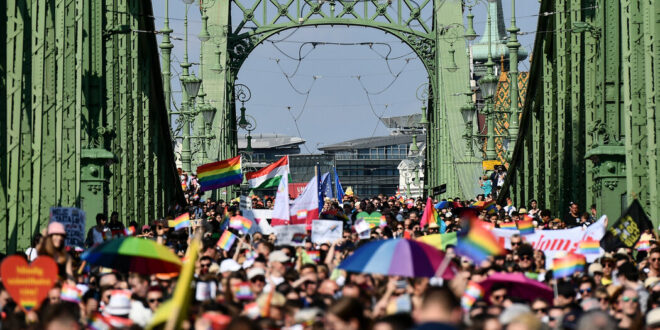BUDAPEST — Defiant, colorful and proud, thousands of Hungarians marched through Budapest on Saturday to support the country’s embattled L.G.B.T.Q. community and to protest the far-right policies of Prime Minister Viktor Orban.
This year’s Budapest Pride march had all the trappings of celebration but it was also a protest, its organizers said, against a recently passed law that critics say equates homosexuality with pedophilia and placed strict limits on sexual education, including banning the portrayal of L.G.B.T.Q. lifestyles to minors. The law is often compared to a 2013 Russian law banning “gay propaganda” that has been widely criticized by rights groups.
Many participants in the march said that the law was an alarming symptom of growing authoritarianism in the central European country.
“We are standing in solidarity with the L.G.B.T.Q. community but we are also standing with anyone threatened by global authoritarian discourse,” said Zoltan Adam, an associate professor of economics at Corvinus University of Budapest. “This law is another step toward authoritarianism taken by this government.”
Since returning to power in 2010, Mr. Orban, whose government enjoys a supermajority in Parliament that enables him to amend the constitution, has introduced laws based on his interpretation of Christian and traditional family values, while promoting a view of society that differs from the progressive liberalism of the West.
The new law has already borne results. One television channel has censored advertisements for soap operas. The country’s second-largest bookstore chain put up signs announcing they sell “nontraditional content” after being fined $830 for not labeling a book portraying same-sex parents as “content which deviates from the norm.”
The less visible results may be more damaging.
“This law will have a tragic effect on young people, with increased suicides and a rise in mental health issues,” said Andras Szolnay, 55, who wore an electric blue wig and traveled from the eastern city of Debrecen to attend the pride march.
He said that when he was an adolescent in communist Hungary, “it was freer than it is now, there was no homophobia or transphobia.” But now, he said, “there is a regression.”
Organizers said attendance at the march appeared to be the biggest in its 26-year history, with the procession taking 40 minutes to pass through the streets of the city. Some participants wore T-shirts emblazoned with “adult content” and “Hungary” wrapped around the number 18, a nod to the fact that the law bans “depicting or promoting” homosexuality and gender transitions in front of minors under the age of 18.
This week, Mr. Orban announced that a referendum on the law would be held by early 2022, ahead of national elections next April.
“This makes gay people feel like they are public enemies,” said Peter Kreko, the director of Political Capital, a Budapest research group.
Though Mr. Orban has asserted that he represents the majority of Hungarians, a poll released in mid-June by Zavecz Research found that 56 percent of Hungarians accept homosexuality and another poll at the same time by Ipsos concluded that 46 percent of those surveyed support same-sex marriage. Another Ipsos poll in May concluded that the same number of people believe same-sex couples should have the same rights to adopt as heterosexuals.
Analysts note that while Mr. Orban is a conservative, the law seems intended to distract from the country’s dire health and economic conditions in the wake of the Covid-19 pandemic, and an effort to break the unity of a coalition of opposition parties that has united to oust him in the upcoming elections.
Mr. Orban’s party, Fidesz, “is doing this for its own purposes: they need to reach the radical wing of the party and this is one potential way to do it,” said Zselyke Csaky of the American democracy watchdog Freedom House.
“Many have lost jobs or are in a difficult situation after Covid, and such ideological messaging can work well with them,” she said.
Others say that the law, which is vaguely written, is an attempt to shift the focus away from recent corruption scandals and democratic deficiencies to identity politics. Hungary has repeatedly clashed with the European Union, which it joined in 2004, over these policies.
The 27-member bloc has initiated two separate legal procedures against Hungary over the recently passed law. The European Union has also delayed and threatened to withhold payment of $8.5 billion in post-coronavirus recovery aid over concerns about Hungary’s judicial independence and shortcomings in its anti-corruption strategy.
Mr. Orban has sought to blame the funding delays on his protection of family values.
“Corruption is mentioned a lot, but it’s obviously a cover story,” he said on Friday.
Speakers at the pride march didn’t buy it.
“The Hungarian government is organizing a hate and fear campaign and scapegoating the L.G.B.T.Q. community to distract from systemic corruption,” Terry Reintke, a member of the European Parliament for the German Green party, said just before the marchers set off.
“This goes beyond Hungary — this is a European issue.”
At the pride march, Szonia Szabo, 15, wondered how her schooling might be affected by the new law. But mostly she worried for her peers, who are still exploring their identities, and for her friends and family who identify as L.G.B.T.Q.
“Some of them are living abroad, and they no longer feel safe returning to Hungary because of the law,” she said.
 Top Naija News: Nigerian News, Breaking News Nigeria and World News Top Naija News is a daily news publication in Nigeria, delivering the latest breaking news in Nigeria and around the world.
Top Naija News: Nigerian News, Breaking News Nigeria and World News Top Naija News is a daily news publication in Nigeria, delivering the latest breaking news in Nigeria and around the world.




